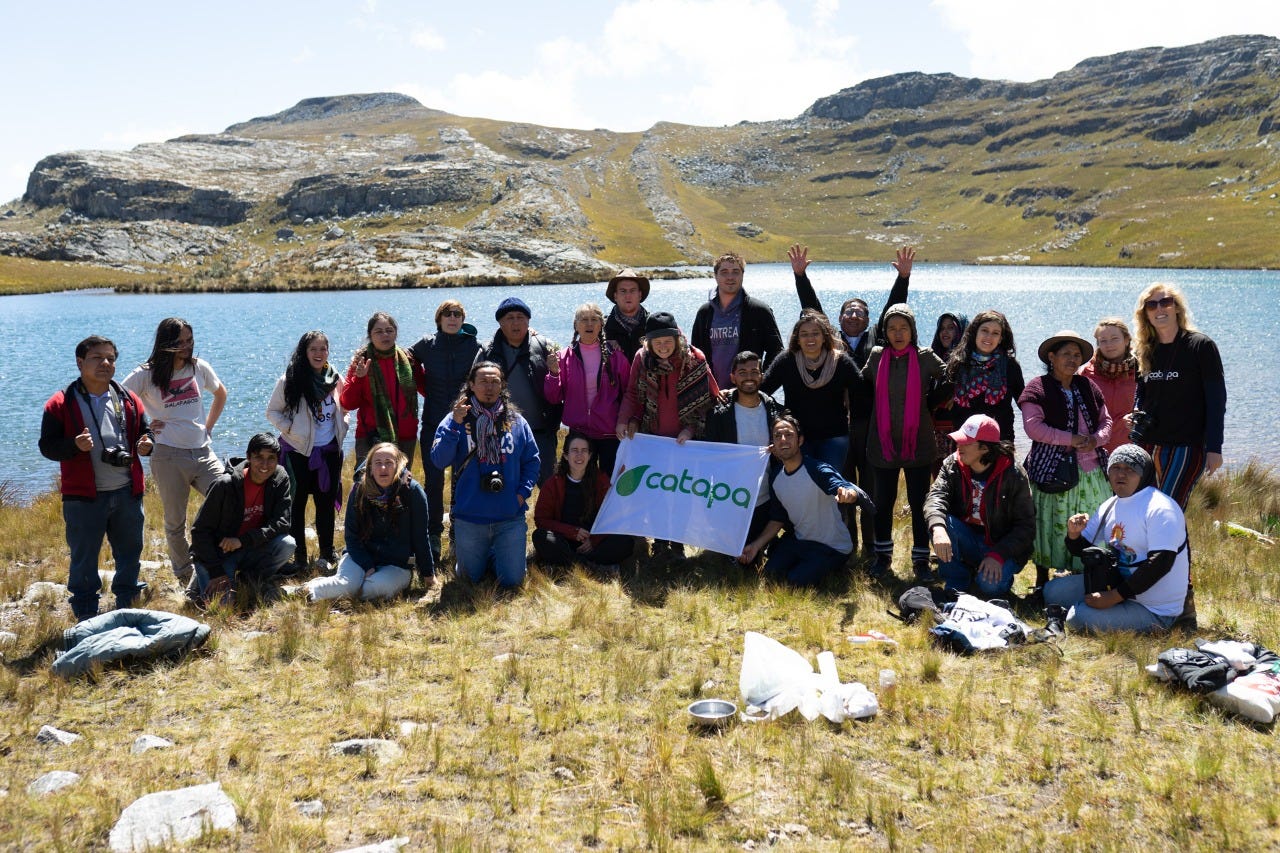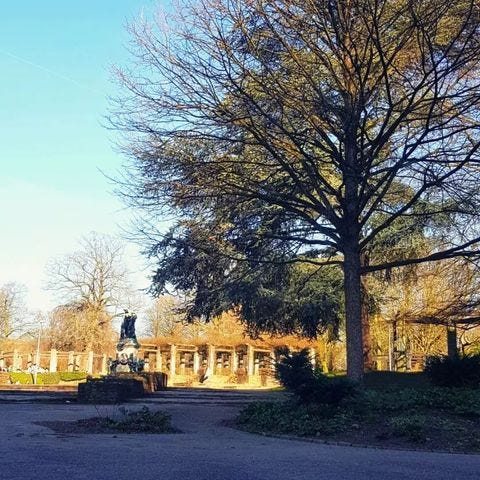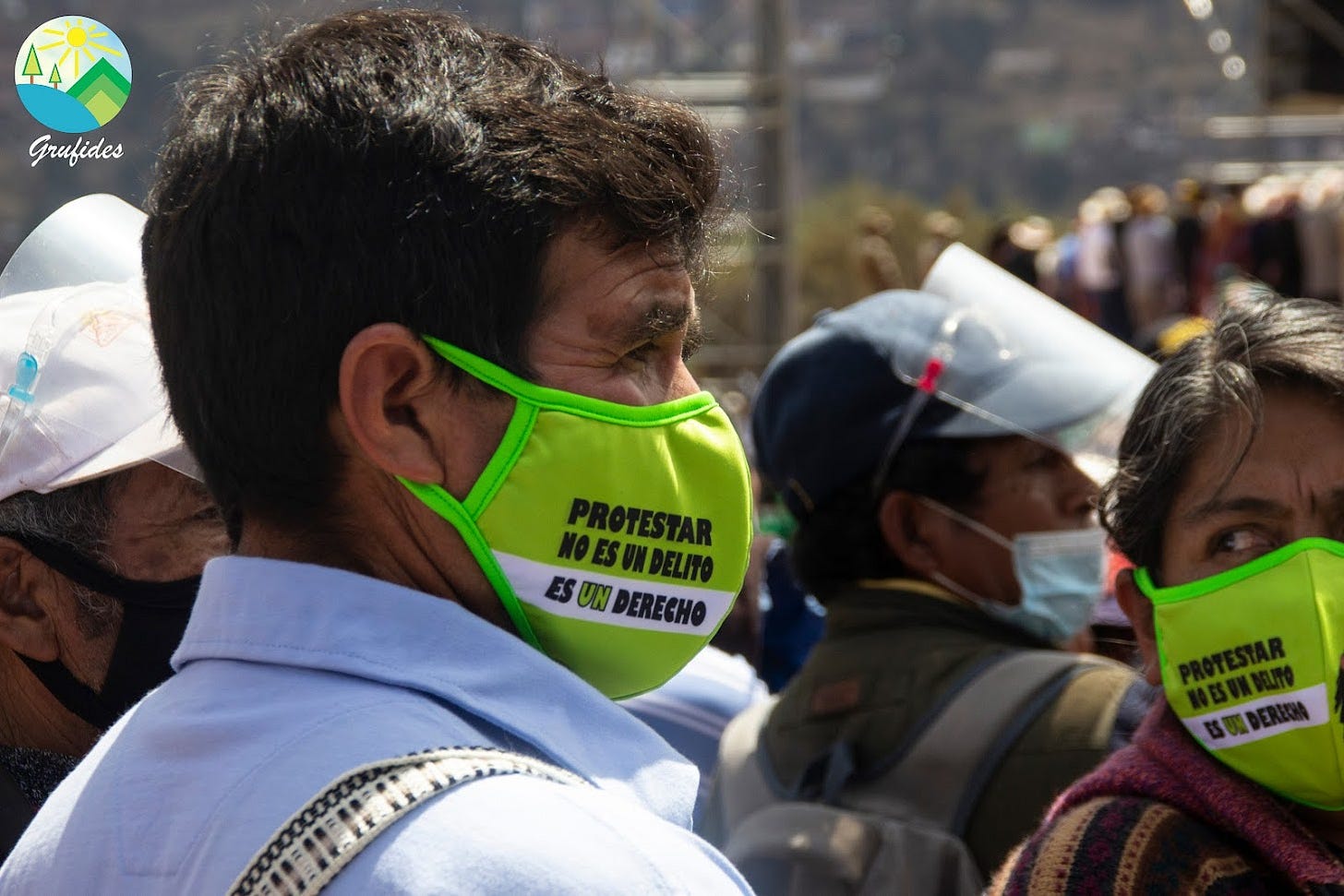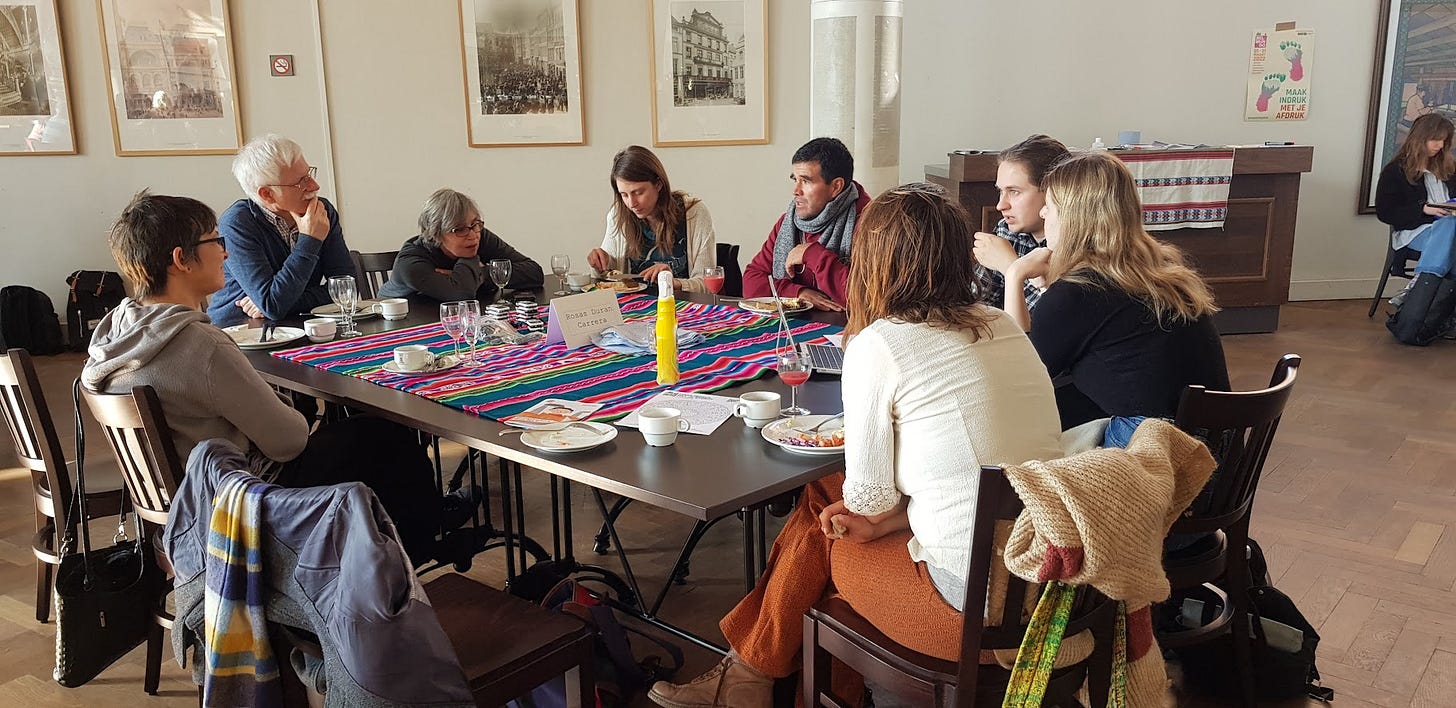"The people of Peru ask for justice."
What would you do if a mining corporation starting digging up your hometown?
Ever been in love?
Not human love. I mean this frantic kind of love. When you’re trying to cling onto something that is fading.
Because my friends keep asking if I’m taking a break soon. And I am (I promise), but here’s the issue - I am in love.
I’m in love with the planet. I am so full of it, I am drunk on it. I feel wild, trying to hold it in but it’s spilling out. How do I turn this off? My work feels like a wedding vow. To love and protect and to cherish.
I want to show policymakers pictures of the birds that are all kinds of wild colours, I want to email everyone I’ve ever known about the trees that grow out of cracks in the pavement.
I could rave like a preacher about the flowers that look like dip-dye and the way that the sky turns purple in the evenings and say - isn’t this just the wildest most amazing thing you’ve ever seen? Isn’t this the coolest thing in the whole damn world? Don’t you love it?
Is this healthy? I am addicted, I am not myself. I feel like I’m on fire when the world burns. When the rivers are submerged, I am wallowing. Climate activism is a love story and this relationship is at a tipping point.
And like a teenager afraid to ask out a prom date, each disaster headline has me weighing myself up in the mirror. A recovering capitalist, a naïve optimist, a well-meaning citizen. Scared to ask, will you have me? Splendid radiant burning planet, will you take me? Can you handle us? Are we good? Are we good enough?
And the parts we need to rebuild our green and fair world are all there. We are in pieces, so is the Earth, perhaps together we can reassemble it into something new. Heaven was here all along - best catch it before it fades.
Help keep the Green Fix running! The newsletter is volunteer-run. If you find this newsletter useful, please consider tipping a virtual coffee.
If you like this newsletter, please help me by sharing it using the button here:
What’s Going On?
Rich countries must end oil and gas production by 2034 to keep world on track for 1.5°C transition.
Useful: Which countries use the most fossil fuels?Both the Arctic and the Antarctic register temperatures 40C above normal (and this is bad).
Relevant: Why is this happening, and how worried should we be?None of the top 30 banks are following through on their climate pledges.
Useful: What does this report actually say?People around the world take to streets for Global Climate Strike and protest Ukraine war.
Relevant: Ukrainian climate scientist on why the war is a climate issue.Boardrooms with more women deliver more on climate, study finds.
Relevant: How does gender inequality hold back climate action?
Focus On… What Happened in Peru
Interview with environmental defender Rosas Duran Carrera. Translated from Spanish. Listen to the recording of this interview in Spanish here and read the Spanish transcript.
My name is Rosas Duran Carrera. I’m a farmer from Cajamarca, Peru. I’m here with the NGO CATAPA to inform European decision-makers and activists that in Peru, mining corporations are destroying our region, contaminating our rivers, our surroundings and our society.
Tell us what’s happening in Peru…
Cajamarca is an agricultural region. There’s a lot of farming, dairy production and livestock breeding. Before mining corporations started work in the mountains, pure water flowed from those mountains.
Before the corporations arrived, we were the fifth poorest region. Twenty years ago, the biggest gold company in Latin America, Yanacocha, arrived in Cajamarca.
They started contaminating our water, killing our biodiversity, changing our way of life, our culture, even our way of talking - the Quechua language is being lost. Now we are the poorest region.
What exactly is so bad about the mining corporations?
They’re multinationals from abroad: Canada, Europe, China, Japan. They come here and either take the local territories or buy them at an extremely low price.
The people who sell their land have always been poor and never experienced a sudden windfall of cash. So they don’t know how to invest. They start to spend it, and use it up. Once they have no money left, they turn to delinquency, to robberies, to drugs. As for those who oppose the mining, [the corporations] threaten them, kill them if they don’t listen.
Video credit: CATAPA
The contamination causes diseases like cancer, animals are being born without heads, ears or feet. Sheep are losing all their wool, there are no more trout in the rivers. The destruction of the vegetation is terrible: flowers, fauna, it’s practically destroyed.
The water which flows from the Cajamarca mountains, flows into the river Marañón - the ‘golden serpent’ in Peru. From there, it reaches the Amazon, into the Pacific Ocean, and into the Atlantic Ocean on the other side. So the oceans are also being contaminated.
How many millions of people depend on the sea and fishing and seafood? The sea holds a wealth of resources. But big corporations don’t care about that, they only think about making a profit.
We want a healthy and thriving environment, with uncontaminated water, so we can cultivate the land, raise [children], and feed our family. But we become poorer and poorer every day, with nowhere to go. The contaminated water is here to stay, and our agricultural production will not be possible.
Mining corporations go to the governments and leaders of each country, and they buy their conscience and legal power - so that they make laws in their favour.
What’s the link between what’s happening in Peru and Europe?
Big corporations spin this tale of having a good relationship with the local communities in mining regions, that the locals gave their permission.
I think the European population don’t know the abuses taking place, so we’re here to tell the world that they must investigate. How are corporations treating local communities? It’s necessary to have activists around the world making people aware of what’s happening.
Do you think that people can change the system? What can I, a random European person, do about the situation in Peru?
Yes, but it has to be through organised action around the world to encourage authorities to change this exploitative system of abuse, to one with laws that favour the people and defend their rights.
Millionaires or businessmen are the 2%, and the rest of us are consumers and producers. People living in the cities are living off what the farmers in the fields and the farms are producing.
City people and millionaires don’t fill their plates with a block of gold to eat. Their glasses are not filled with oil to drink. Water is the source of life, agriculture is the source of life. This is what we must protect.
What inspires you? How do you keep fighting?


I have been fighting for around 20 years. I’ve been criminalised, sentenced, threatened, defamed. This is what corporations do. We have to be strong to fight back against it.
As social justice defenders we see the Earth as a living being. We can see ourselves physically - our face, eyes, physical features - but we don’t see how our body works inside. This is how we see the Earth, because its soul, the way it transforms water and creates oxygen all happens underneath us, so that we can live well.
If we cut our arm, we bleed, but we don’t see the blood inside our body. This is what mining corporations are doing. They are destroying the veins of water and water no longer flows in the areas they’ve mined. We don’t know where the water will flow from now.
It’s a disgrace what is happening to indigenous communities, to Amazonians, and everywhere in the world. It pains my soul to see how they’re destroying the Andes mountain ranges.
Authorities must stop these abuses so these local communities can live a dignified life. The people of Peru ask for justice, they ask for peace in the place they live.
I think we will succeed - it will take a long time, but I have hope and faith that we will have justice.
Want to know how you can help? CATAPA is launching a new campaign today against unsustainable mass production of electronics.
David Huylebroeck, a campaigner at CATAPA:

The Ctrl Alt Delete campaign is about planned obsolescence. Planned obsolescence is a huge error in the system. The name Ctrl Alt Del is because we want to reset the system, we want this error out of it. The industry makes ICT products in a certain way so that they’ll break after a specific period.
To produce these ICT products, we need a lot of extractivism and mining to get these critical raw materials. A GSM contains 60 different critical metals, and I think that we sell over 1.5 million GSMs a year. To get these raw materials we need this open-pit mining, which is one of the worst ways of mining, it’s so intrusive, it’s so devastating for the land and its inhabitants.
If you’re interested and want to help the real struggle against mining companies, please go to our website. You can donate and you support the local communities where we have a strong bond so they can keep up the fight and afford food. It’s hard to combine work and activism. But the better thing is to become a volunteer and help us in this struggle.
You can read a full interview with CATAPA campaigner David here. Follow CATAPA and their new campaign on Instagram @catapa_vzw and Twitter @CATAPA_Belgica.
So Now What Do I Do?
LEARN MORE
Join us at the Tech for Justice Unconference tonight! Free for participants under 35 or with the promo code GREENFIX.
Read: What is urban mining and could it help save the planet?
Tune into this Nesta webinar on how to harness your climate anxiety. 14 April at 13h CEST.
TRY SOMETHING NEW
Register for free for the virtual Skoll forum for 2 days of webinars on global progress from 4-6 April.
Sign up for a free online course on ‘Designing for Sustainability and Social Impact’. Starts 5 April.
Submit your idea for how young people can promote human rights education in the UN Global Youth Challenge. Deadline 30 April.
CHANGE THE SYSTEM
Closing tomorrow! The UN is holding its first ever global survey of activists under 25. Fill it out by 31 March.
Youth & Environment Europe is looking for a volunteer to hold a round of interviews with activists from marginalised backgrounds. Apply by 11 April.
Are you working in an NGO in Brussels? Help build more transparent salary conversations in this focus group.
By the way…
The Green Fix is now offering low-cost sponsored slots on the newsletter. Book your slot here.
In Aging Well News, we take what is known a step further. We ask readers to examine, challenge, and change unhelpful beliefs and habits, accept what is now normal, and manage practical issues as they arise.
If you have a topic you want The Green Fix to cover, fill out this feedback form & tell us your idea!
Stay in the loop
You can connect with me on Instagram, Twitter and LinkedIn. You can also follow the Green Fix Twitter and LinkedIn page here for more climate opportunities.
Know someone interested in environmental issues? Forward this email to them - we want to reach people who care about doing more for the planet, with your help.








Great interview!